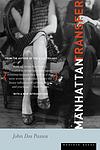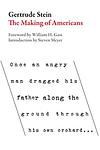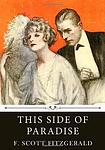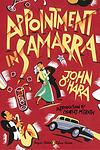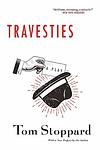The Greatest American, British "Modernist, Fiction" Books Since 1900
Click to learn how this list is calculated.
This list represents a comprehensive and trusted collection of the greatest books. Developed through a specialized algorithm, it brings together 305 'best of' book lists to form a definitive guide to the world's most acclaimed books. For those interested in how these books are chosen, additional details can be found on the rankings page.
Genres
Modernist literature is a category of books that emerged in the early 20th century, characterized by a break from traditional literary forms and a focus on individual experience and perception. Modernist writers experimented with language, form, and structure, often using stream-of-consciousness narration and fragmented storytelling to convey the complexity and ambiguity of modern life. Themes of alienation, disillusionment, and the search for meaning are common in modernist literature, which reflects the cultural and social upheavals of the time. Overall, modernist literature is a challenging and thought-provoking genre that continues to influence contemporary literature and culture.
Countries
Date Range
Reading Statistics
Click the button below to see how many of these books you've read!
Download
If you're interested in downloading this list as a CSV file for use in a spreadsheet application, you can easily do so by clicking the button below. Please note that to ensure a manageable file size and faster download, the CSV will include details for only the first 500 books.
Download-
26. The Sheltering Sky by Paul Bowles
"The Sheltering Sky" is a novel about an American couple, Port and Kit Moresby, who travel to the North African desert accompanied by their friend Tunner. The journey, initially an attempt to cure their marital woes, quickly descends into a harrowing journey of self-discovery and exploration of the human condition. As they move further into the desert, the harsh environment and their isolation from the outside world push them to their psychological limits, leading to devastating consequences.
The 495th Greatest Book of All Time -
27. V by Thomas Pynchon
"V" is a complex novel that intertwines two parallel narratives. One follows Benny Profane, a discharged U.S. Navy sailor involved in a group of bohemian artists and hooligans called the Whole Sick Crew, while the other narrative is a series of historical accounts researched by Herbert Stencil, who is on a quest to uncover the identity of an entity known only as V. The narrative oscillates between various global locations and time periods, including Egypt in 1898, Southwest Africa in 1922, and Malta in 1919, among others. The book explores themes of entropy, human connection, and the nature of identity.
The 574th Greatest Book of All Time -
28. Loving by Henry Green
"Loving" is a novel set in an Irish castle during World War II, focusing on the lives of the servants who work there. The narrative provides a detailed and intimate exploration of the relationships, gossip, and everyday routines of the domestic staff, while the war remains a distant threat. The book is known for its unique use of language and dialogue, as well as its exploration of class dynamics.
The 585th Greatest Book of All Time -
29. Miss Lonelyhearts by Nathanael West
This novel revolves around an advice columnist, who writes under the pseudonym "Miss Lonelyhearts", for a New York newspaper during the Great Depression. As he reads and responds to the desperate letters from the city's distressed and downtrodden, he becomes increasingly disillusioned and depressed, struggling with his own faith, identity, and the bleakness of the human condition. The protagonist's personal life also spirals out of control, entangling him in a series of complicated romantic relationships and leading to a tragic conclusion.
The 658th Greatest Book of All Time -
30. Manhattan Transfer by John Dos Passos
This novel presents a panoramic view of New York City between the 1890s and the 1920s, capturing the sense of the city through the lives of its inhabitants. The narrative weaves together the stories of numerous characters from diverse backgrounds, including immigrants, businessmen, and bohemians. These characters' lives intersect and diverge, reflecting the dynamism and complexity of the city itself. The city is portrayed as a place of both opportunity and disillusionment, where dreams are both realized and shattered.
The 678th Greatest Book of All Time -
31. Three Lives by Gertrude Stein
"Three Lives" is a series of novellas that explore the lives of three working-class women living in the United States at the turn of the 20th century. Each story provides a detailed psychological portrait of a different woman: a black housekeeper, a worldly-wise servant, and a lower-middle-class German woman. The narrative delves into their personal struggles, their relationships, and their attempts to navigate the societal constraints of their time.
The 851st Greatest Book of All Time -
32. Prufrock and Other Observations by T. S. Eliot
This collection of poems presents a critique of society through the lens of a disillusioned modern man. The titular character is a middle-aged man contemplating the emptiness and lack of fulfillment in his life. The poems delve into themes of despair, regret, and existential angst, reflecting the disillusionment of the post-World War I generation. The poems are characterized by their innovative use of dramatic monologue, stream of consciousness, and other modernist techniques.
The 914th Greatest Book of All Time -
33. The Making of Americans by Gertrude Stein
"The Making of Americans" is an experimental novel that explores the concept of identity and the human condition through the lens of two American families. The author uses repetitive and complex prose to delve into the intricacies of family dynamics, social status, and personal development. The narrative is less about plot progression and more about the philosophical exploration of what it means to be an American, offering a unique perspective on the cultural and psychological tapestry of the nation.
The 994th Greatest Book of All Time -
34. Goodbye to Berlin by Christopher Isherwood
This novel is a semi-autobiographical account of the author's experiences in 1930s Berlin. The protagonist, a young Englishman, observes and documents the lives of a wide range of characters, from the working class to the upper class, all against the backdrop of the rising Nazi regime. The book offers a vivid and poignant portrayal of Berlin and its inhabitants during a time of great political and social upheaval.
The 1025th Greatest Book of All Time -
35. The Professor's House by Willa Cather
"The Professor's House" is a narrative revolving around a middle-aged professor who is struggling with a mid-life crisis. As he moves into a new home, he can't help but feel disconnected from his family and former life. His only solace is his unfinished study in his old house, where he spends most of his time. The book also explores his relationship with his former student, Tom Outland, whose story of discovering an ancient Native American settlement in the Southwest impacts the professor deeply. The novel explores themes of change, nostalgia, and the search for meaning in life.
The 1209th Greatest Book of All Time -
36. If I Forget Thee, Jerusalem by William Faulkner
The novel is a collection of four related stories, each focusing on a different protagonist. The stories are set in the Southern United States and explore themes of love, loss, and the struggle to survive in harsh circumstances. The characters are often isolated and alienated, struggling with their own personal demons and the harsh realities of their environment. The narrative style is complex and challenging, with frequent shifts in time and perspective, reflecting the fragmented and chaotic nature of the characters' lives.
The 1286th Greatest Book of All Time -
37. Arrowsmith by Sinclair Lewis
The novel follows the life of a bright and dedicated young man, Martin Arrowsmith, who dreams of making significant contributions to medical science. He faces a constant struggle between his ambition and the demands of his professional and personal life. His journey takes him from a small Midwestern town to the prestigious universities of the East Coast, and eventually to a deadly outbreak in the Caribbean. Throughout his journey, he grapples with the corruption, greed, and mediocrity that he finds pervading the medical field, all while trying to remain true to his scientific ideals.
The 1288th Greatest Book of All Time -
38. The Hamlet by William Faulkner
"The Hamlet" is a complex narrative that explores the lives of the Snopes family, their rise to power, and their struggle with morality in a small southern town. The story is filled with themes of greed, manipulation, and the quest for power, as the Snopes family uses cunning and deceit to gain control over the town and its inhabitants. The novel is a vivid portrayal of the dark side of human nature and the destructive power of ambition.
The 1320th Greatest Book of All Time -
39. The Unconsoled by Kazuo Ishiguro
The book follows a renowned pianist who arrives in a Central European city to give a concert. However, his time there becomes increasingly surreal and disjointed as he is pulled in different directions by the demands of the locals, his own past, and his responsibilities. The narrative explores themes of memory, time, and self-delusion, creating a dream-like atmosphere that blurs the lines between reality and illusion.
The 1340th Greatest Book of All Time -
40. This Side of Paradise by F. Scott Fitzgerald
This novel follows the life of Amory Blaine, an attractive and privileged young man who grows up in the early 20th century United States. It explores his experiences in prep school, at Princeton University, and in the real world after graduation, as well as his relationships with a series of young women. The protagonist's life is marked by his pursuit of wealth, status, and love, and his eventual disillusionment with the values of his society. The novel is a critique of the American Dream and a reflection on the lost generation of the 1920s.
The 1556th Greatest Book of All Time -
41. Crome Yellow by Aldous Huxley
"Crome Yellow" is a satirical novel set in an English country house, where a diverse group of guests gather for a summer holiday. The narrative explores various themes such as love, art, religion, and education through the conversations and interactions of the characters. The novel is known for its witty dialogue, social commentary, and for being an early example of the author's social criticism.
The 1562nd Greatest Book of All Time -
42. Justine by Lawrence Durrell
"Justine" is a novel set in pre-World War II Alexandria, Egypt, and is the first in a quartet of books. The story is told from the perspective of an Irish teacher living in Alexandria, who becomes entangled in a complex love triangle with a beautiful Jewish woman named Justine and her husband, a wealthy Coptic Christian. The narrative explores themes of love, betrayal, and cultural tension against the backdrop of a city teeming with political intrigue and social unrest.
The 1562nd Greatest Book of All Time -
43. Appointment in Samarra by John O'Hara
This novel explores the self-destruction of the main character, a successful and respected car dealer, over a three-day span during the Christmas season in 1930. After a series of impulsive and reckless actions, including alienating his friends and family, having an affair, and getting involved with organized crime, the protagonist spirals out of control, leading to his tragic demise. The book offers a critique of the vapid and hypocritical aspects of high society in a small Pennsylvania town during the Great Depression.
The 1601st Greatest Book of All Time -
44. Pilgrimage by Dorothy Richardson
"Pilgrimage" is a sequence of semi-autobiographical novels that follow the life of the protagonist, Miriam Henderson, through her journey of self-discovery in the late 19th and early 20th centuries. The narrative explores Miriam's experiences, thoughts, and feelings, as she navigates through her life, dealing with issues of feminism, love, and social expectations. The book is notable for its stream of consciousness writing style, which allows readers to experience Miriam's inner world in a profound and intimate way.
The 1613th Greatest Book of All Time -
45. The Moon And Sixpence by W. Somerset Maugham
The novel is a fictionalized account inspired by the life of the painter Paul Gauguin. It follows Charles Strickland, a stockbroker who abandons his wife and children to pursue his passion for painting. Strickland's relentless and uncompromising pursuit of artistic expression leads him to a life of poverty in Paris and ultimately to Tahiti, where he finds a new muse in the exotic landscape and people. His disregard for social convention and personal relationships is portrayed in stark contrast to his sublime artistic achievements, raising questions about the nature of genius, the sacrifices made for art, and the price of personal freedom.
The 1671st Greatest Book of All Time -
46. Tender Buttons by Gertrude Stein
"Tender Buttons" is an avant-garde collection of prose poetry, divided into three sections: "Objects," "Food," and "Rooms." The book is renowned for its experimental, stream-of-consciousness style, and its abstract, often nonsensical language. It challenges traditional narrative and linguistic structures, creating a unique exploration of everyday objects and experiences. The work is a significant contribution to modernist literature and a pioneering example of feminist writing.
The 1761st Greatest Book of All Time -
47. Sleepless Nights by Elizabeth Hardwick
"Sleepless Nights" is a novel that weaves together memories, reflections, and fictionalized episodes to paint a portrait of a woman's life. The narrative is fragmented and non-linear, reflecting the protagonist's introspective journey through her past relationships, experiences, and observations. Set against the backdrop of various American and European backdrops, the book delves into themes of love, loss, identity, and the complexities of the human condition. The protagonist's musings are interlaced with vivid character sketches of the people who have drifted in and out of her life, creating a tapestry of poignant and evocative vignettes that capture the essence of her restless, contemplative existence.
The 1780th Greatest Book of All Time -
48. Two Serious Ladies by Jane Bowles
Two Serious Ladies is a novel that follows the lives of two women, Christina Goering and Frieda Copperfield, who are both on their own personal journeys of self-discovery. Christina, a wealthy spinster, decides to abandon her comfortable life to explore the darker side of society, while Frieda, a married woman, leaves her husband during a trip to Panama to pursue a relationship with a teenage prostitute. The novel explores themes of identity, sexuality, and societal norms, challenging traditional notions of femininity and respectability.
The 1927th Greatest Book of All Time -
49. In Parenthesis by David Jones
In Parenthesis is a semi-autobiographical novel set during World War I, focusing on the experiences of a British infantryman from his enlistment to his injury in the Battle of the Somme. The narrative combines prose and poetry to depict the harsh realities of war, including the camaraderie between soldiers and the chaos and horror of battle. The novel is noted for its detailed and realistic portrayal of trench warfare and its exploration of the psychological impact of war on soldiers.
The 1981st Greatest Book of All Time -
50. Travesties by Tom Stoppard
The play is a comedic and intellectual romp through Zurich during World War I, where the lives of historical figures like the Dadaist Tristan Tzara, the novelist James Joyce, and the communist revolutionary Lenin intersect through the unreliable memories of British consular official Henry Carr. The narrative is a playful, non-linear exploration of art, politics, and the nature of memory, blending slapstick humor with sharp wit and literary allusions. The work challenges the audience to consider the role of the artist in society and the impact of political upheaval on cultural expression, all while questioning the reliability of history and the very nature of truth itself.
The 2304th Greatest Book of All Time
Reading Statistics
Click the button below to see how many of these books you've read!
Download
If you're interested in downloading this list as a CSV file for use in a spreadsheet application, you can easily do so by clicking the button below. Please note that to ensure a manageable file size and faster download, the CSV will include details for only the first 500 books.
Download



